Luckin Hedge Mulching - Proving McConnel's Superiority
Editorial: Rural Contractors & Large Scale Farmers Magazine - August 2023
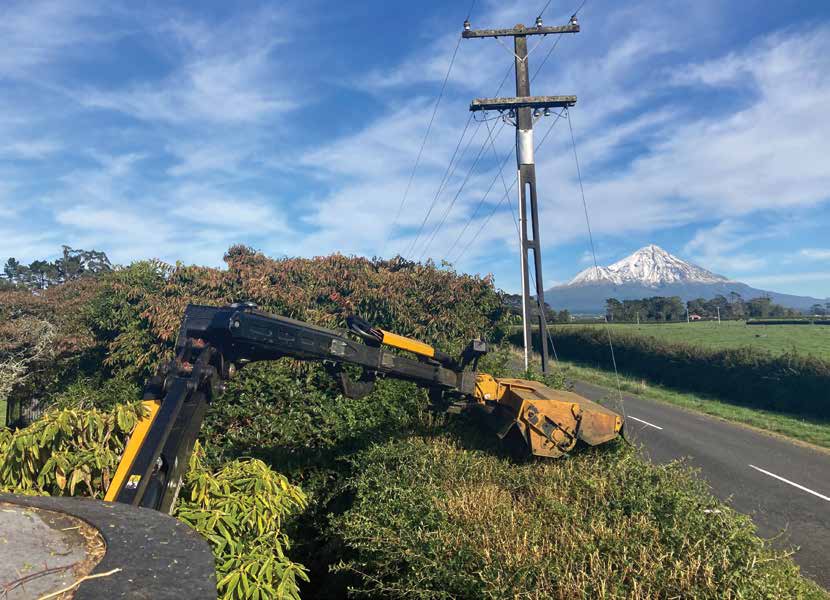 “My mother-in-law pointed out that I have spent a lot of time driving everyone else's gear, so I may as well drive my own. I definitely like how it has all worked out.”
“My mother-in-law pointed out that I have spent a lot of time driving everyone else's gear, so I may as well drive my own. I definitely like how it has all worked out.”
Sam and his wife Sarah are based in central Taranaki, between Stratford and the village of Cardiff (to the west of Stratford). They offer hedge trimming and mulching services.
He works mainly with dairy farmers, but also dry stock farmers and lifestyle block owners in central and south Taranaki.
“There are a lot of dairy farms in the area and sheep and beef farms in the hills. We go wherever we are needed, if someone rings we go. Where there are hedges to be cut we go.”
Sam is firmly rooted in Taranaki, having been born and bred on a dairy farm east of Stratford. His parents still own a 350 cow dairy farm, where his brother is employed as the contract milker.
“It is just up the road, so I go up and cut some hedges when they want some done.”
Sarah was also raised on a local dairy farm, around the corner from where they are now based. After leaving school, Sam trained as a structural engineer and soon found he had a passion for anything “hot, heavy and sharp”.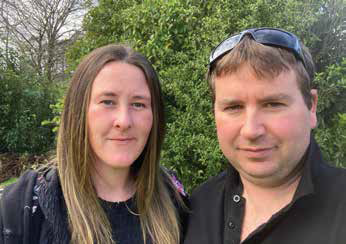
He went to work for a local contractor in south Taranaki. There he worked alongside several Irish workers. “After the second year they convinced me to go back to Ireland with them, so I spent three months driving over there and saw how they did it. It made sense seeing it. The guys said it was a lot in quieter Ireland compared to New Zealand. “The ground is wetter because it rains a lot more and crows peck holes in the silage as soon as it has been baled, so there was a team coming along right behind to pick them up. It was definitely an eye opener.”
Sam returned to Taranaki, where he continued working for a local contractor. He then became a self-employed contractor for a number of years, providing contract labour for around half a dozen local contractors. Then in May 2021 came the opportunity to buy the hedge trimming equipment off Hinton Contracting, a large Taranaki contractor, that was looking to downsize a bit. “I was filling in for different contractors, driving diggers or trucks or doing tractor and trailer work. I was making silage for whoever needed a hand, until this opportunity came up.”
TRACTORS AND TRIMMERS
Sam runs three Massey-Ferguson tractors, which range in power from 140 hp to 160 hp. They run two McConnel hedge mulchers. “It is quite good having a bit of size and weight in your tractors when you are on the hills,” Sam says of his tractors. “Having the mulchers on the side tends to throw them round a little bit.”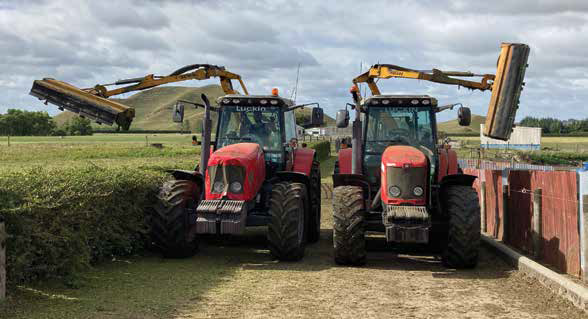
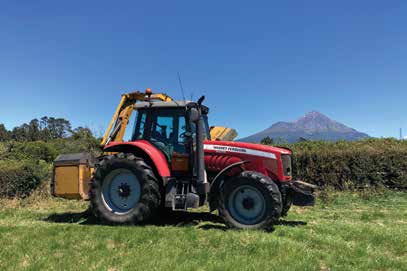
Two of the tractors run on DynaVT constantly variable transmission, which makes them simple to operate, he says. “They are pretty good. You don't have to keep changing gears and I can have them going at 2 kph and then get them up to 11 kph when I am heading over to the next hedge. “You don't have to fully go through the gears. I can just keep cruising on.” Fieldtorque in Stratford is Sam's tractor dealer. It is owned by another branch of the Hinton family and has a good range of parts in store. The staff at Fieldtorque have been good to deal with, he says. Sam says the McConnel brand is well-established.
“McConnel mulchers tends to be what the other brands model on and they seem to handle what we are doing.”
He purchased two mulchers from Hinton Contracting and has since bought a new machine, which had 90 hours on the clock. This led to a change around with the machines. “Everything on the new mulcher is real tight and smooth. It has a few extra features I wouldn't have specified, but now I wouldn't be without them.”
He bought his McConnel mulchers from Agriquip in New Plymouth, which is the local importer for the McConnel brand and has a good range of parts. “You just cruise on up. They are a friendly bunch and they provide a good service and good parts. If you are ever having a problem, you can ring up for tech support and they talk you through it.”
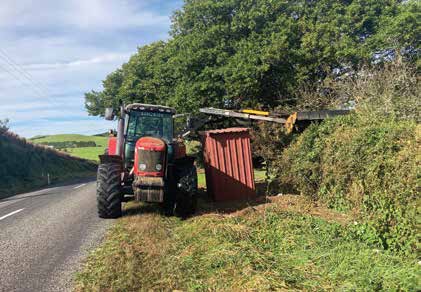
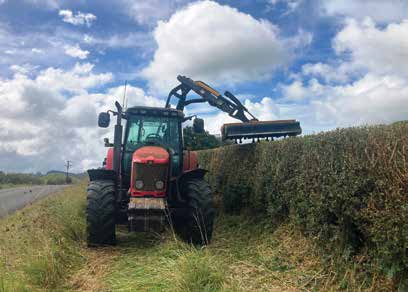
Being a structural engineer by trade, Sam looks to do as much preventative maintenance as he can himself. “On the mechanical stuff, I am pretty good, but for the electrical stuff, they send someone out or they point us in the right direction. “I do all my own servicing and transmission changes, but for something major or electrical or if something's not quite working out, I can ring for reinforcements.”
One of the Massey Ferguson tractors has done 18,000 hours, so it is ready to become the backup tractor, Sam says. “I'm on the lookout for a bargain. I will keep an eye out and see what is about. When something pops up I will jump on it.”
Being a new business, Sam has yet to develop a replacement policy, but he likes to keep an eye on TradeMe and AgTrader to see what is on offer.
So far there have not been too many logistical challenges when it comes to moving the tractors and mulchers around the Taranaki countryside, he says. “The beauty of the hedge mulcher is that you just jump in the cab and away you go.” Where possible he will try to line up two or three jobs in an area, before moving on to another area. And he will often pick up work on the way. “We try to be as efficient as we can, so we are not just driving around everywhere.”
Sam employs “a young fella” full-time, while Sarah takes care of the administration, the wages and invoices. She also “cracks the whip”. “We didn't know how much work we were going to pick up when we took over the business. There are other contractors who do hedge trimming but they also do silage and other services, so they get in the gate like that and then offer a full service. “For the first year I didn't know how many hours I was going to do and I ended up doing 1300 hours in the first six months. That was probably a bit too much, so in January we took on a young fella and he has worked out really good.”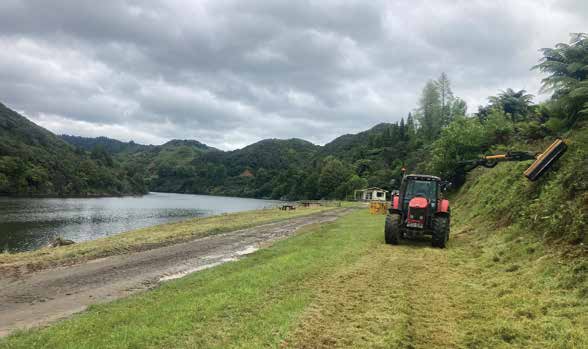
Hedge trimming tends to be seasonal work. It dries up once calving starts in July, and then it picks up again in September. It then goes quiet again as farmers focus on cutting silage and then it picks up again over Christmas and runs until June. To tide himself over, Sam still picks up work with contractors cutting silage and does other jobs when the hedge trimming work quietens down. “I can take the mulcher off and hook a baler on my tractor and then go back to mulching after a couple of months.”
Coming from a farming background certainly has its advantages. He knows how to work around a farm's other operations when he comes in to do the mulching, Sam says. “It definitely makes it easier when you go on to a farm. For example, you know when you come on to the farm that they are going to be milking in the morning and the evening, so it is a good idea to do the races when it is not milking time.”
Sam says there is an art to trimming a hedge. “Mulching is definitely the hardest thing I have ever done in a tractor. There is definitely an art to it. “I am not sure how much you can do to improve it with technology. I suppose you could put GPS in, but it would be fairly expensive.”
With the rising costs of farming, hedge trimming can become a fringe item. “The work can vary because farmers don't have to do their hedges every year. Some farmers want it done every six months, while others might leave it for a couple of years or even five years.” Fuel is a big cost and there are question marks for how much longer contractors will be able to burn diesel.
Sam doubts electric tractors and mulchers are the future, but he wonders whether hydrogen might be an option going forward. “But how do you fill up your tractor with hydrogen? Do you pour hydrogen in or do you just pour the water straight in? “I am just a small factor. Imagine some of these large contractors who have a large fleet having to switch over to an alternate energy source.”
For now Sam is just happy cutting hedges and maintaining good relationships with other local contractors – especially those who don't cut hedges. “You can spread yourself too thin and most contractors tell you the biggest headache is finding good staff and retaining them, or having good staff move on. So, by concentrating on one thing it makes it easier for us. We can make sure we are doing it well.”
Farm ownership is always an option. “We tried to buy a farm in the middle of last year, but it didn't pan out. We are always on the lookout for a bargain, so we will see what happens. “I think I would always have some degree of contracting and Taranaki is definitely a place where there are plenty of hedges.” While other parts of the country have seen dairy conversions over the last few decades, which has led to trees and hedges being pulled out, Taranaki seems to be doing the opposite, Sam says. “If anything farms are converting back to beef. There are a few getting out of dairying and going to dairy grazing or beef or leasing the land out.” Sam says if he did buy a farm, it would be more practical to do dairy grazing and run beef cattle, rather than milk cows. That way, he can tie it in with mulching.
Whatever the future holds, agriculture certainly seems to be in the blood for the young family. Sam and Sarah have two daughters and their eldest daughter already has a little tractor of her own, just like dad, which she won in a competition through Fieldtorque. "It is hard work getting out of the house in the mornings because she always wants to come,” Sam says. “I took her out with me in the cab on a drizzly Friday morning, when I just had a job for an hour, and ever since then I am not allowed out of the house without her.”
Click here to download the original Rural Contractors article